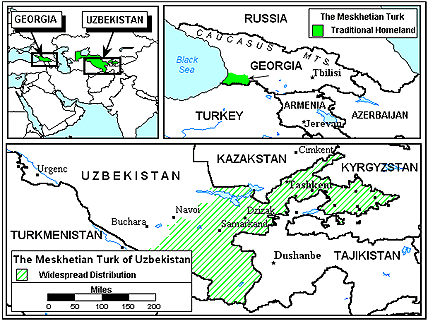|
|
Prayer Profile
The Meskhetian Turk of Uzbekistan
![[IMAGE]](../images5/0755.jpg) The homeland of the Meskhetian Turk, known as Meskheti, lies along the borders of Georgia and Turkey. During the rule of the Ottoman Empire (1299-1922), Turkish settlers moved into Meskheti as part of Turkey's expansion. The resulting mix of Turkish and Meskheti populations became known as the Meskhetian Turk. The Russians call them the Meskhetian Turki, or "Turks from Turkey," rather than using the more generic term for Turk.
The homeland of the Meskhetian Turk, known as Meskheti, lies along the borders of Georgia and Turkey. During the rule of the Ottoman Empire (1299-1922), Turkish settlers moved into Meskheti as part of Turkey's expansion. The resulting mix of Turkish and Meskheti populations became known as the Meskhetian Turk. The Russians call them the Meskhetian Turki, or "Turks from Turkey," rather than using the more generic term for Turk.
In 1944, Stalin forcibly moved the Meskhetian Turk from their traditional Georgian homeland to southeastern Uzbekistan. Although they long to resettle in Georgia, the Georgian government refuses to allow them to return unless they replace their Turkish family names with Georgian ones and acknowledge themselves as Georgians. However, most still insist on retaining their Turkish national identity while continuing their efforts to return to Georgia.
What are their lives like?
The deportation of the Meskhetian Turk to Uzbekistan strengthened their ethnic awareness and produced strong internal leadership. The leaders' goals are to resettle in Georgia while still maintaining the people's ethnic identity and preserving their traditional culture.
Before the 1944 deportation, the Meskhetian Turk lived in rural villages. They were skilled farmers who developed sophisticated agricultural techniques, including the use of wood and ceramic conduits for crop irrigation. They raised cattle and crops, then sold their fruits, vegetables, wool, meat, and dairy products at the local Georgian markets. Most of their agricultural practices, along with distinctive architecture and other cultural aspects were lost in the move to Uzbekistan. Today, festival costumes, headgear, and foods are some of the few items that provide a glimpse of their traditional culture.
One special tradition still survives—the Meskhetian Turk marriage. The official matchmaking is conducted at the bride's home. There, the girl's father receives the bride price and both families celebrate the betrothal with a banquet. On the day preceding the wedding (which always takes place on a Friday), a mullah (Muslim leader) confirms the marriage in the presence of two witnesses. The wedding is a joyous community affair celebrated with colorful costumes and decorations. After the celebration, the wedding couple departs for their new home, which is built especially for them.
What are their beliefs?
All of the Meskhetian Turk are Hanafite Muslims. Although they faithfully observe the Islamic rituals, they either add to or deviate from some customs. For example, for several nights after funeral rites and a burial, a fire is lit over the grave. When a Meskhetian Turk sees a fire in the distance at night, he will begin praying for the dead.
Even though the Meskhetian Turk are strong Muslims, they still hold to some of their pre-Islamic beliefs in magic and sorcery. The practice of inducing rain by magic is common, along with healing by the use of "moon water," or water that has set overnight under a clear sky.
The Meskhetian Turk also celebrate rituals and festivals connected with agriculture. For example, farmers may break eggs over the heads of their oxen before beginning the season's plowing. Spring weeding is followed by a folk festival with dancing, games, fortune telling, pantomimes, and sometimes, weddings.
What are their needs?
The Meskhetian Turk believe that they were removed unjustly from their homeland. As a result, they have lost most of their cultural heritage. The need to maintain their ethnic identity can only be done by preserving their traditional culture. They need to know that their true identity can only be found in Christ.
Even though the Bible, the Jesus film, and Christian radio broadcasts are all available in the Turki language, there are no reports of even one Christian among them. The Meskhetian Turk need missionaries to work among them and show them the love of Jesus in practical ways.
Prayer Points
- Ask the Lord of the harvest to send forth laborers to live and work among the Meskhetian Turk of Uzbekistan.
- Pray that God will raise up prayer teams to break up the spiritual soil through worship and intercession.
- Ask God to anoint the Gospel as it goes forth via radio to the Meskhetian Turk.
- Pray for effectiveness of the Jesus film among the Meskhetian Turk.
- Pray that God will reveal Himself to these precious people through dreams and visions.
- Take authority over the spiritual principalities and powers that are keeping the Meskhetian Turk bound.
- Ask the Holy Spirit to soften the hearts of the Meskhetian Turk towards Christians so that they will be receptive to the Gospel.
- Ask the Lord to bring forth a triumphant Meskhetian Turk church for the glory of His name!

See also the following Group:
The Diaspora Turks
Statistics
Latest estimates from the World Evangelization Research Center.
THE PEOPLE
- People name: Meskhetian Turk
- Country: Uzbekistan
- Their language: Turkce
- Population:
- Largest religion:
- Christians: None
- Church members: None
- Scriptures in their own language: Bible
- Jesus Film in their own language: Available
- Christian broadcasts in their own language: Available
- Mission agencies working among this people: None
- Persons who have heard the Gospel: 38,000 (31%)
- Persons who have never heard the Gospel: 84,600 (69%)
THEIR COUNTRY
- Country: Uzbekistan
- Population:
- Major peoples in size order:
- Major religions:
- Number of denominations: 22
© Copyright 1997
Bethany World Prayer Center
This profile may be copied and distributed without obtaining permission
as long as it is not altered, bound, published
or used for profit purposes.
![[HOME BUTTON]](../graphics/home.jpg)
![[CALENDAR BUTTON]](../graphics/calico.jpg)
![[LIST BUTTON]](../graphics/listico.jpg)
[Home]
[Calendar]
[Country List]
|